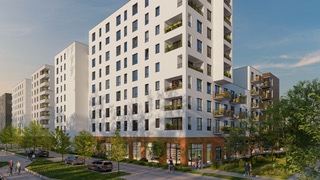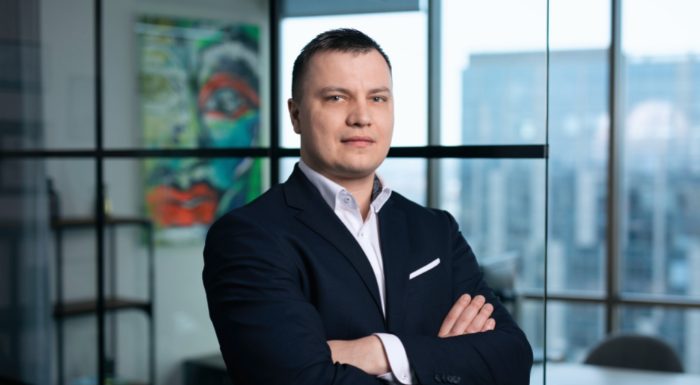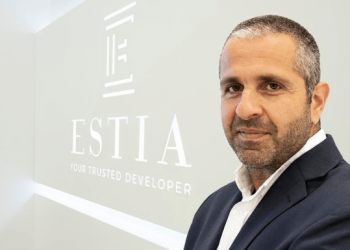CITUS is a Lithuanian real estate developer primarily focused on residential projects.
CEEREM: You became CEO of CITUS in 2020, in the midst of the global pandemic. What motivated this decision and what was the vision you brought on board?
Before joining CITUS, I was the head of another major group (Axis / Axioma) in Lithuania, which belonged to ICOR group, and the original plan was to wrap up my work there in 2020 and just rest for a few months. But then the pandemic came along and my phone started ringing, including my old friend and owner of CITUS who asked me to join them.
The vision we are pursuing at this time is to become a top three player in Vilnius and the most effective developer. Real estate is a race against time — as soon as you buy a land plot the clock starts ticking so we are very strict with our timelines.
CEEREM: The pandemic treated the residential sector well in most European countries, has this been the case for CITUS as well?
The market had a full stop during the first quarantine last year, between April-May, but it was a brief period. In June the market started rising again and it exceeded even the most optimistic forecasts — imagine that 2019 was the best year in the history of our real estate market and that entire volume was matched in August this year. We have four months left and already surpassed the all time record.
This caused the rapid increase in prices: since December 2020 they increased by 20-25%.
CEEREM: What do you credit for this record breaking evolution of the market?
First off, life never stopped — people got married, divorced, had children which gave them reasons to change their flats. On the other hand, spending so much time at home made people think of their surroundings more and sometimes reconsider their living premises.
Secondly, everyone started fearing inflation (with good reason as the inflation rate reached 4.3% last month in Lithuania, compared to 3% at EU level) and real estate is seen as a safe investment. And there was also the effect of spring – February, March and April all had record sales.
CEEREM: Referring specifically to CITUS, what are some of the exciting projects you have under works?
We have a lot of projects currently. Two of them are particularity large, 25,000 square meters each. The first one is in Druskininkai, a major resort where people go for rest and recreation. We bought a former sanatorium there and we are converting it into flats, about 360 units in total. The second territory is located in the northern part of Vilnius, a strategic area that has numerous commercial sites, parks, two major sports arenas, etc. Our plan is to turn it into commercial spaces and flats.
One other project that is fairly unique is Miško ardai which means “flats in the middle of the forrest”. It is a prestigious and unique residence not too far from the city center. These are just a few examples, but several others are being worked on by our team.
CEEREM: You take pride in being an innovative company, open to new technologies. How does this translate into your work more specifically?
That’s right, we are strong in developing unique concepts, be it a running track in your yard or a pool in the forest.
Our project Aeronamai is also a good example. Developed in 2018 it is the first smart passive residential building in the Baltic States, having the highest energy class of A++ and a Passivehouse certificate and being self-sustaining with a solar power plant. It is an open experimental project and a very successful one.
CEEREM: Are good plots of land easily accessible nowadays in Lithuania?
No, it’s actually very tough. It is a sellers’ market, “take it or leave it” kind of situation. Sellers negotiate with several developers at once and the one with biggest wallets wins.
CEEREM: A special tax for land is also under discussion in the Lithuanian Parliament, what are your thoughts on that? In what way does it impact your business?
Indeed, it is a tax that would apply to state owned land. In Vilnius almost half of the territories available are owned by the state. What the government wants is for developers to pay a tax that amounts (depending on conditions of land usage) up to about 75% of the land value — needless to say that is a lot. The prices are already high and this would push them even higher.
I would also note that the government recently introduced an infrastructure tax, which is between EUR 30 in priority territories in Vilnius and 50 EUR in non-priority territories in Vilnius per square meter developed. A one time payment that must be made before getting permission to build. Ironically, paying this tax does not guarantee that the infrastructure will be built. It is quite a challenge for the industry.
CEEREM: Bearing these challenges in mind, what still makes Lithuania’s attractive for a company like CITUS?
In a nutshell, affordability of flats is at an all time high and bank interests at an all time low. We joke often that we never lived so good in Lithuania before, the average wage in Vilnius is now around EUR 1800 per month which is an all time high. Also, Vilnius’ population keeps growing with about 8000-10,000 people every year and this keep pushing the market up. Potential is very much there and our priority now is to manage our own growth.
















